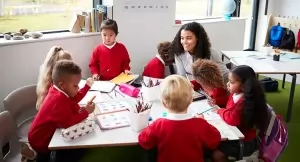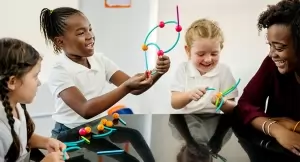How to effectively teach from home
Coronavirus has thrown us into a world of chaos and uncertainty. As a result of growing restrictions schools are having to figure out and adapt to new ways of delivering their pupils education.
We’ve put together some helpful tips you can follow if you find yourself suddenly becoming a virtual teacher.
Establish a work space
When working from home it’s important to differentiate home space from work space. This will help create a clear division between your work life and personal life.
Make sure your work space is light, airy and not cluttered. To avoid any unnecessary distractions whilst delivering online classes, keep your background plain and reduce any glares from windows by closing the curtains.
If space is limited don’t worry, you can still change the space around you. For example, having text books, pens, paper and worksheets on hand during work and then putting them away out of site when you finish work.
Plan ahead and test
Technology is vital for remote learning being successful, however using new technology for the first time can be daunting. Spend some time familiarising yourself with the new resources you’ll be using. Speak to other colleagues with their experiences and carry out a trial run to make sure any technical glitches are ironed out.
Decide as soon as possible who will be responsible for what types of IT support, and how they will be reachable by students, families, and staff. Make sure they all know how to reach out for support.
Give teachers, students, and families video and written instructions on how to use your platform so they can answer some of their own questions before reaching out for help.
Structure and schedule
Your school should provide with a timetable to follow and list of what topics to cover. However, if your school does not provide this then we would strongly recommend you create your own. This will help keep you in routine and help you to plan your work.
Pupils will also benefit from a structured day which has routine similar to how they would have had if they were learning in school.
A structure and schedule will also help draw the line between ‘work time’ and ‘personal time’ giving you a balance of them both. Include time for breaks so that your pupils and yourself have a break as you would in school.
Set expectations
Talk to your pupils and help them understand the new way of learning. Listen to their concerns, questions and reassure them. This will be just as daunting for them as it is for you. Tell them what you are expecting from them including homework, deadlines, time keeping and behaviour. Keep parents fully informed and make sure they are aware your expectations. You’ll need their contribution to make sure this works.
Let go of perfectionism
Virtual teaching is a new challenge for everyone, so try not to overcomplicate the work you are delivering. Don’t worry about the finer details or trying to make your slides all singing and dancing. When teaching online keeping things simple is key. This will help to avoid any technical glitches such as files not loading correctly or applications freezing.
Remember everyone will be using different types of devices i.e. desktop PC, laptops to tablets so it’s important this is taken into account.
Make it fun
No matter how old your students are, they will all appreciate from a bit of fun. Plan some time in during the day for quizzes, games and even throw in some meditation, yoga, or just quiet time to help them relax and prepare for what’s next. There are lots of online activities you can access and do a group. It will help them to release energy and prevent them from burning out.
Additional resources
Don’t try to do create everything yourself, use the array of online resources available. There are thousands of free projects, worksheets, educational videos, guides and audio clips you can download. Below are some of the popular online resources.
BBC Teach https://www.bbc.co.uk/teach
BBC Bitesize https://www.bbc.co.uk/bitesize
Twinkl https://www.twinkl.co.uk/
We Are Teachers https://www.weareteachers.com/
2 simple https://2simple.com/purple-mash/
Classroom secrets https://kids.classroomsecrets.co.uk/
iDEA https://idea.org.uk/about
History Learning Site https://www.historylearningsite.co.uk/
Find time for yourself to reflect and re-focus
Online learning is a new experience for you and your students. Make time for yourself to reflect on how the experience is going for you and for your students—but remember: you’re not expected to be perfect.
Ask yourself questions like:
- Are all the children engaged and focused?
- Are you able to deliver what you set out to do?
- What could I do to make learning more accessible, inclusive, and meaningful?
- How are we, as a class, doing physically, mentally, and emotionally?
It’s also worth asking colleagues to see how they are getting on with online teaching. Sharing ideas, tips and collaborating together will help to deliver a more effective education.
Dare to get creative on #NakedTeachingDay?
UK based charity World Wide Education Project (WWEP) is encouraging all teachers to try ‘Naked Teaching’ on Friday 30th September to raise awareness of children around the world who go tomakeshift schools in slums, in refugee camps, under trees and under bridges.
Naked Teaching is nothing dodgy! Honest!
It is an opportunity for teachers to experience what it is like to teach without any resources. It’s a chance for teachers to stick the supplies back in the store cupboard, unleash their inner inventiveness and undress their lessons. You could even take the kids outside and lose the walls and the chairs too.
To help you get started, try one of these 5-minute resource free teaching strategies that can be adapted to teach just about anything: (But beware – as Naked Teaching goes, the following ideas are hard-core because they don’t even involve paper or pens.)
Nina Jackson, a teacher who helped to come up with the campaign, advises: "Connecting and developing purposeful learning relationships with the children is key. Good eye contact and a great smile always works. It exudes safety, support and confidence. Even if you’re feeling nervous yourself!"
The charity hopes to raise awareness and funds for many impoverished children around the world. To donate go to justgiving.com/ww-ep
Will you be brave enough to strip down, boldly join in with #NakedTeaching and #NakedTeachingDay and share your pics and ideas with us.
If you are not working on the day you can still take part in other ways such as no TV or radio, not using any forms of transport, or even going as bold as not using your mobile phone!
Go on....give it go!
How to make it fun in any classroom
In any classroom, striking a balance between serious learning and fun can be a fantastic way to ensure the kids are kept engaged and interested in what you're teaching them.
Having fun activities and keeping things light from time to time means pupils don't dread coming to class, and means they're far more likely to listen to you, especially when they've got something to look forward to.
We take a look at the top ways you can help make it fun in your classroom.
Start the week right
Monday morning isn't the best time of the week for anyone, let alone kids who have just enjoyed a fantastic weekend with their friends and family, and getting people engaged with work at this time of the week can be hard. Why not let them start their school week with memories of the weekend.
Have some circle time on a Monday morning and allow kids the chance to tell everyone else what a great time they had. Doing so will mean they feel excited about what they did at the weekend, and you'll start your teaching on a happy note, giving more scope for better Monday learning.
Fun time
In many schools across the country, fun time or golden time can be a good way to incentivise kids to get everything done and do well in their school work. Once a week, set aside some time to allow those who have worked hard throughout the week have fun.
It's a good idea to award time to kids throughout the week so they feel like they've earned a little time to do what they want on a Friday afternoon. Let them choose from a range of games, craft activities and other fun things and they'll look forward to it all week.
Sing along
The rise of movies such as Frozen has given kids a new love for the world of singing along to popular songs, and you can bring this into the classroom with a little singing time as a class to let everyone express themselves.
Choose one afternoon a week to get everyone together in one place and have a good sing along. It can even be a good idea to let people take turns choosing the songs you'll all sing so that everyone really feels like a part of it.
Crafts
Everyone loves crafts and being arty, and kids perhaps more so than anyone else. We all loved Art Attack as kids ourselves, so why not bring the spirit of Neil Buchanan back into your adult life by showing kids how they can be creative with things they find at home.
Invite your pupils to bring things from home and then challenge them to turn them into great works of art that can have pride of place as decorations in your classroom. Not only will this be great fun for all involved, it'll be a fantastic way to allow more creativity to flow through your lessons.
Top five ways to get pupils paying attention
Every class has those few pupils who it is hard to gain the attention of throughout the day. At some points, it'll be just one or two, and then for harder and drier lessons it can sometimes feel like the whole class's attention has gone on holiday and left their empty shells in front of you, refusing to learn.
Here, we take a look at some novel ways to help pupils pay attention better in your classroom, sure to help any teacher in times of real frustration.
Regular recaps
Nothing will make someone pay attention more than the worry that they might be asked what is going on and not know. Let it be known in your class that you'll regularly be looking for someone to recap the lesson so far so everyone can keep up, and the chances are, everyone will be paying attention so they don't end up looking like they weren't paying attention on the off chance their turn comes around.
Talking item
When it comes to answering questions, have an item, a soft toy or the like, that gets passed randomly to the next person to answer. If pupils don't know they're next, but are aware they might well be, then the chances are they'll be listening in. Not only that, but they'll be far more likely to engage and think of answers before it comes to them, helping enhance learning throughout the lesson.
Flashing lights
Sometimes, no matter how hard you try, attention spans will falter and you'll be in front of a class that was once working hard, but is now deep in a 30-person chat about who the best Kardashian is, or the like. The best way to tackle this is with a quick sensory gesture. Flashing the lights on and off will grab everyone's attention, and they're sure to know you're not best pleased quick as a flash.
Allow texting
Sounds like such a weird notion, but allowing pupils to text their answers to each other, which the recipient then has to read out, is a really great way to engage everyone. Pupils are basically glued to their phones these days anyway, so why not use this to your advantage? Besides, most people are probably faster with a phone than a pen these days anyway, so you're likely to get through a lot more!
Walking talking
If it feels like you're losing the class' attention, say late on a Friday afternoon, why not take the chance to be a little bit different and help them engage in a different way? Leave the classroom and take the kids for a stroll around the playing fields for a while, all the time keeping the same conversation from the classroom alive to keep people engaged.










